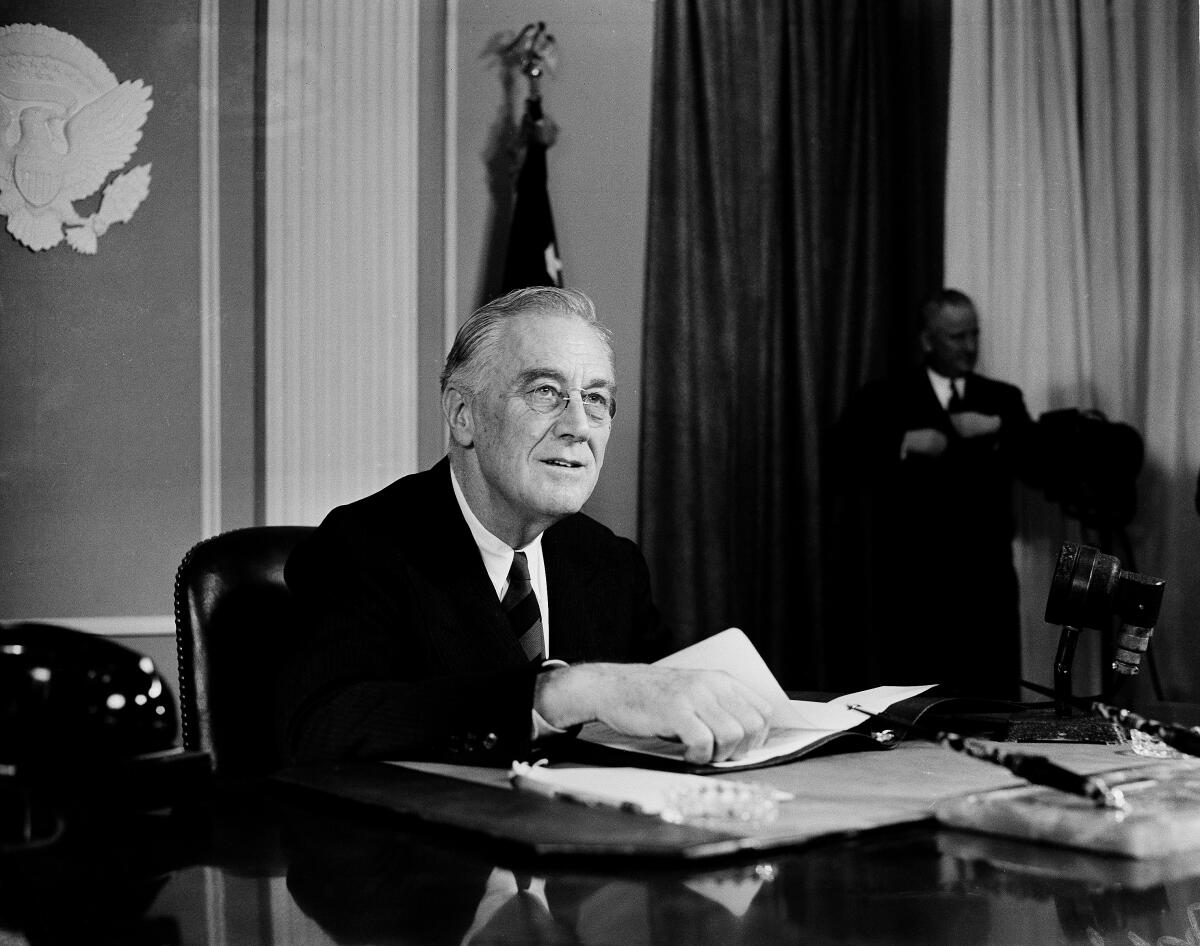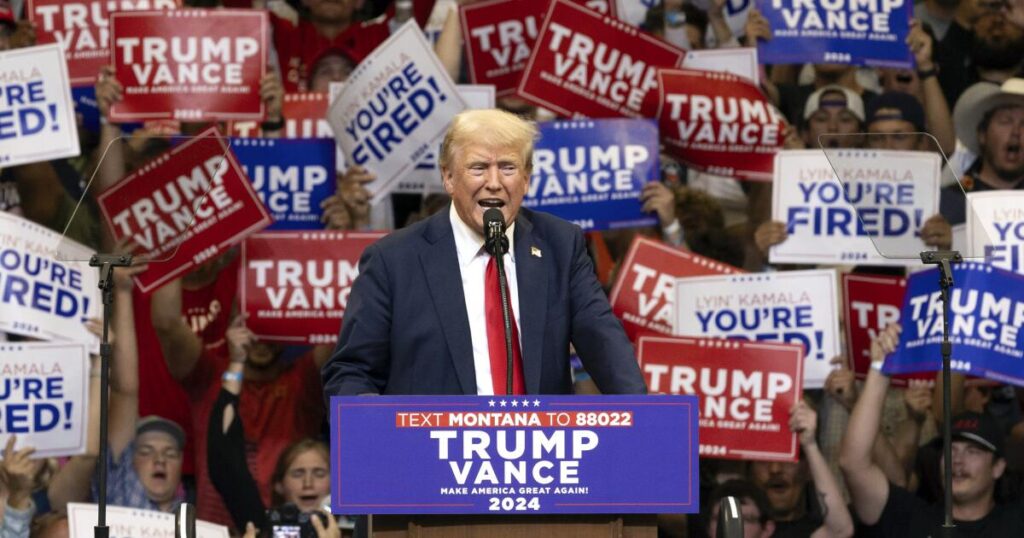WASHINGTON — In a private meeting at a global summit in Buenos Aires in 2018, China’s president, Xi Jinping, turned to President Trump and said it was a shame he couldn’t stay in power beyond the two-term limit set by the U.S. Constitution. Trump agreed.
It was just one of several instances in which Trump mused over the prospects of an extra-constitutional reign in the White House.
“He’s talked about it for a really long time,” said John Bolton, Trump’s national security advisor from 2018 to 2019, recalling the meeting. “It’s on his mind, and he’d like to do it.”
The possibility of Trump running for a third term gained fresh attention this weekend after the president told NBC that he was “not joking” about pursuing one.
“There are methods,” Trump said. “But I’m not — it is far too early to think about it.”
Attorneys, scholars and state officials disagree. The knowledge that Trump may bid to stay in power, in a direct challenge to the 22nd Amendment, already has election officials in secretaries of state offices throughout the country bracing for legal battles that could begin as soon as next year.
The plain language of the amendment, which states that “no person shall be elected to the office of the President more than twice,” will also factor into local races starting next year for secretaries of state across the nation — key offices that will determine ballot qualification and interpret, or ignore, inevitable rulings on Trump’s eligibility from the courts.
It will not happen
— Alan Dershowitz, constitutional professor, on a third Trump term.
“Individual states and federal courts would almost certainly move to keep him off ballots,” said Alex Conant, former communications director for Marco Rubio’s 2016 presidential campaign and a founding partner of Firehouse Strategies. “It could,” he added, “get messy.”
Some of Trump’s most prominent current and former attorneys doubt that the president has a path to a third term, absent a laborious, politically challenging and time-consuming constitutional amendment. An amendment must be approved by three-fourths of the states (38 out of 50).
Pam Bondi, the president’s attorney general, told senators in her confirmation hearing that Trump could not serve a third term “unless they change the Constitution.”
“It could not happen absent a constitutional amendment, which could not possibly be enacted in time,” said Alan Dershowitz, a longtime constitutional professor at Harvard and a lawyer to Trump during his Senate impeachment trial. “It will not happen.”
And yet in Arizona, where Trump and his allies tried to overturn the election results in 2020 to remain in power, discussions are already underway over the logistical pathways Trump might take to secure ballot access there. As in many other states, Arizona’s process for accepting candidates onto primary ballots relies heavily on the internal decisions of political parties.
How could Republicans, who are so reluctant to defy Trump, oppose such an effort?
“The first line of defense would be the Republican Party standing up for the Constitution and saying, ‘No, you’re constitutionally ineligible, so we’re not going to put you forward as a candidate,’” said a former Arizona election official, granted anonymity to speak candidly.
“But assuming that that fails, and the Republican Party nominates Trump for a third term, then they would try to submit his name and his vice presidential nominee, and their presidential electors in Arizona, to the secretary of state’s office for ballot qualification. That would be the office to assess legal grounds for refusing to put them on the ballot.”
The term for Arizona’s secretary of state, currently a Democrat, ends in 2027.
Given the opportunity, five senior administration officials within Trump’s inner circle contacted by The Times refused to rule out an effort by Trump to remain in office. The White House referred to a statement by the president’s press secretary, Karoline Leavitt, to reporters on Monday in which she said, “It’s not really something we’re thinking about.”
Bolton, who went from Trump loyalist to fierce Trump critic, says otherwise.
“People need to think about it,” Bolton added. “Trump’s thinking about it, you can guarantee that.”
Obscure ‘methods’
Trump launched his prior reelection bids historically early, announcing his first on Jan. 20, 2017 — the day of his first inauguration — and his second in November 2022, just a week after the midterm elections that year. This time, Trump’s supporters began calling for another run within weeks of him taking office.
Trump was excluded from a straw poll of 2028 candidates at this year’s Conservative Political Action Conference. But “Trump 2028” material still circulated the event, drawing vocal support from prominent figures in the party, including Sen. Lindsey Graham of South Carolina.
Stephen K. Bannon, a former White House strategist to Trump during his first term, said last month that he, conservative attorney Mike Davis and others are devising strategies for Trump to stay in office, warning that Democrats will try to imprison the president if he relinquishes power.
“We’re working on it — I think we’ll have a couple of alternatives,” Bannon told NewsNation. “We’ll see what the definition of term limit is.”
Legal challenges could come swift and early, experts said.
“Could he solicit money legally for something which you’re ineligible to run for? That might be the first place where somebody would have standing to sue,” said Andrew Rudalevige, a professor of government at Bowdoin College.
The “methods” and “alternatives” referenced by Trump and Bannon are not clear. But Trump acknowledged one idea circulating among his supporters: Running for the vice presidency, and then either having the elected president resign or allowing Trump to effectively run the government.
That plan would face multiple hurdles, requiring Trump to trust someone enough to win the presidency and relinquish power to him.
It would also raise questions over the 12th Amendment, which states that “no person constitutionally ineligible to the office of President shall be eligible to that of Vice-President.”
“It’s just cut and dry — he’s ineligible,” said Richard Painter, former chief White House ethics lawyer during the George W. Bush administration, “and to put an ineligible candidate on a state ballot for a primary, you’re denying everyone in that political party the right to vote for president, because someone ineligible is on the ballot.
“I think you could go to federal court for an injunction, and I think the Supreme Court might just have a nationwide injunction against it,” Painter added.

President Franklin D. Roosevelt, speaking at the White House in 1944, broke a tradition established by George Washington when he ran for a third and fourth term.
(Henry Burroughs / Associated Press)
Only one former president, Franklin Delano Roosevelt, ran for and won more than two terms in office, breaking with a tradition that started at the advent of the nation.
“The norm created by George Washington was that the president would serve only two terms, and then Roosevelt decided not to,” said Peter Kastor, chair of the History Department at Washington University in St. Louis. “After FDR died, before the conclusion of his fourth term, a variety of people came together and concluded they needed to codify the notion of a two-term presidency.”
Now, with the 22nd Amendment in place, the question legal scholars and election officials are asking isn’t whether the law is clear, but whether Trump will follow it.
“I don’t think I’ve really heard serious discussion among serious people — there are certainly musings about it among conservatives, but not necessarily conservative lawyers,” said Curt Levey, president of the conservative Committee for Justice.
“There’s no doubt that the administration is being assertive and it means to test the boundaries of executive authority,” Levey added. “But I think it’s extremely unlikely that he would order Republican officials, in many states, to defy court orders — and even if he ordered them, doesn’t mean they would comply.”
Trump will be 82 at the end of his current term, older than President Biden was when he ran for reelection against Trump last year.

